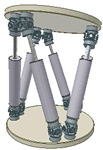



| home |
| about the meeting |
| main speakers and courses |
| talks/posters |
| registration form |
| study group |
| organizers |
| travel & accomodations |
| participants |
| poster |
| timetable |
| contacts |
| documentation |
| impact |

Main Speakers and minicourses
TimetableMinicourses
- Discrete models applied to real
industrial problems (Prof. Agostinho Agra, Universidade de
Aveiro, Portugal)
Abstract:
During the course two practical problems are introduced and
modelled. The mathematical modelling discussion of these problems is
used to exemplify several issues occurring during the resolution of
practical problems, such as: the importance of mathematical modelling
and theoretical research in solving real problems; discrepancies
between solving theoretical and real problems; importance of
interdisciplinary.
- Multiphysics problems and industrial applications (Prof. Alfredo Bermudez de Castro, Departamento de Matematica Aplicada, Universidade de Santiago de Compostela, Spain)
Abstract: Many
industrial
processes involves several physical phenomena, usually coupled. The
course deals with some examples arising from the metallurgical and
the power generation industries. The first part concerns mathematical
modelling and numerical simulation of induction furnaces. We
introduce the models for the electromagnetic, thermodynamic and fluid
dynamic phenomena, analyse the couplings among them, and propose
numerical methods for computing their solution. The second part, we
will consider mathematical modelling of pulverized coal boilers.
This process involves two-phase reacting flows. We consider coupled
models for the gas and the condensed phases and propose numerical
methods for their solution.
- Flow control in the presence of shocks: theory, numerics and applications (Prof. Enrique ZuaZua Iriondo, Basque Center for Applied Mathematics, Bilbao - Spain)
Abstract: Flow
control is one of the most challenging and relevant topics
connecting
the theory of Partial Differential Equations (PDE) and Control Theory.
On one hand the number of possible applications is huge including
optimal shape design in aeronautics. On the other hand, from a purely
mathematical point of view it involves sophisticated models such as
Navier-Stokes and Euler equations, hyperbolic systems of conservations
laws, that constitute, certainly, one of the main challenges of the
theory of PDE. Indeed, some of the main issues concerning existence,
uniqueness and regularity of solutions are still open in this field.
Moreover, Control Theory also faces some added difficulties when
addressing these issues since the possible presence of singularities on
solutions makes often classical approaches fail.
In this minicourse we present recent joint work in collaboration with Carlos Castro and Francisco Palacios in which we propose a new alternate direction method that allows not only dealing with shocks but also taking advantage of their presence to make the optimization processes to converge much master.
In this minicourse we present recent joint work in collaboration with Carlos Castro and Francisco Palacios in which we propose a new alternate direction method that allows not only dealing with shocks but also taking advantage of their presence to make the optimization processes to converge much master.
- Mathematical Methods for Portfolio Management (Prof. Stanley R. Pliska, Department of Finance, University of Illinois at Chicago, USA)
Abstract: These lectures will cover the three
basic quantitative methods of portfolio management beginning with the
mean-variance approach introduced by Harry Markowitz. Being a trade-off
between risk and expected return, this involves quadratic programming.
Second is the expected utility maximization approach that was
introduced in a discrete time context by Samuelson and solved with
dynamic programming. Merton extended this to continuous time and, using
stochastic control theory, showed how to solve this with PDE’s. Third,
the speaker introduced the risk neutral approach for portfolio
management. Here the problem of maximizing the expected utility of
terminal wealth is solved via martingale theory and convex optimization
theory. Some examples will be given of how these approaches might have
been applied to some recent financial data. If time permits attention
will be given to some extensions such as risk sensitive portfolio
management and the inclusion of features like consumption, income, and
the opportunity to buy life insurance.
VENUE
Edificio das Matematicas da FCUP
Rua do Campo Alegre, 687
4169-007 Porto
Portugal